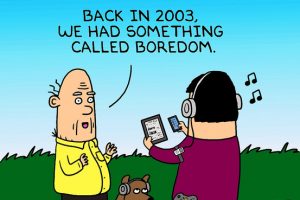Everyone is familiar with the sensation of boredom, and the mentality many of us have is to avoid being bored as much as we can, regardless if you are on the commute, waiting for your coffee, or even on the toilet. But would you believe that every time you reach for your phone out of boredom to see the latest memes on Facebook, you might have made yourself less creative, less altruistic, and less likely to think of the future?

Social Media as a Means to Prevent Boredom (image source)
The fear of being bored may be stronger than we might think, in a study conducted at Harvard University, participants were asked to sit in a room alone during which the only thing available was a button that, if pressed, administers a mild electric shock. The volunteers were confined for around 15 minutes and told to “entertain themselves with their thoughts” but could self-administer the shock if they wished. Of all the participants, 25% of women and 67% of men shocked themselves. The result is particularly intriguing considering that they had previously told the experimenters that they would pay money to avoid the shock. Evidently, they would rather experience physical pain than having nothing to keep them occupied but their thoughts.
What exactly is boredom? Contrary to popular belief, it is not merely when you have absolutely nothing to do, it is in fact when none of your options available are appealing, essentially a state of being underwhelmed and lethargic. Nowadays, there are more ways than ever to escape boredom, with all the social media apps, television, etc., but by doing so, are we losing anything? Scientific research says yes, and what we are losing is important.

Ted Talk: How boredom can lead to your most brilliant ideas by Manoush Zomorodi (Youtube)
When you are bored, your mind naturally wanders. This study seeks to answer if such wandering is useful for creativity. The researchers grouped volunteers and asked each group to perform a random task, the most boring of which was to read a telephone directory. They were then asked to generate as many ideas as they could for what one could do with a plastic cup. The result showed that those in the most boring read-the-phone-book condition came up with the most creative solutions compared to less bored controls. Paradoxically, despite boredom making us sluggish and disinterested, it may spur us into action, getting us to make changes that would be positive in our lives.
Furthermore, boredom has been suggested to maybe people more altruistic. Bored individuals are more likely to donate to charity and to give blood. Apparently, the opportunity to do meaningful, even if unpleasant activities have more value when you are bored.
In the absence of boredom, one may become unknowingly trapped in unfulfilling situations, and miss out of many cognitively, emotionally and socially rewarding experiences. In the end, it’s better to think of boredom as a warning that we are not doing what we want to be doing, and as a subtle yet powerful force that motivates, sometimes with flashes of brilliance.
James Wang

One response to “Does Boredom Have Scientific Benefits?”